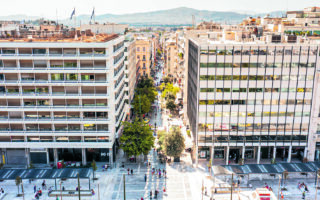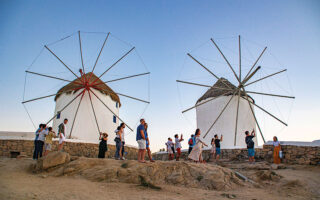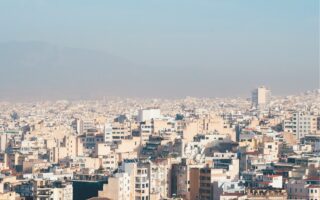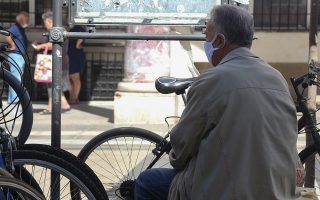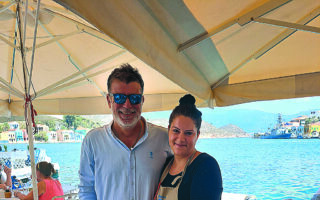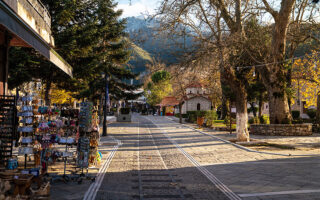Athens Democracy Forum turns 10
Taking a look back at how the conference in association with The New York Times and Kathimerini evolved into an international institution
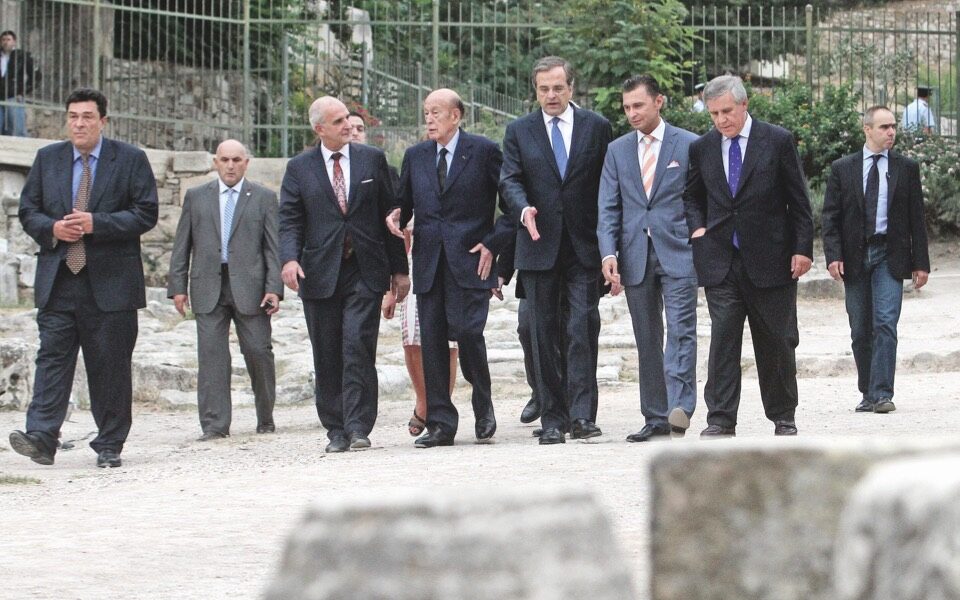
In October 2012, Greek Prime Minister Antonis Samaras was the keynote speaker at the IHT Global Conversation, an event marking the International Herald Tribune’s 125th anniversary in Paris. A year later, the IHT became The International New York Times, with 2013 also marking 15 years in its partnership with Kathimerini. But it was at the event in Paris, following Samaras’ speech, that then IHT Vice President Achilles Tsaltas thought to himself, “Why not have a Global Conversation in Greece?” Now, Tsaltas looks back on those days ahead of the 10th anniversary edition of the Athens Democracy Forum, an event that began as an idea and evolved into an institution.
Tsaltas remembers how he reached out to Kathimerini’s director, Alexis Papachelas, and the editor in chief of Kathimerini English Edition, Nikos Konstandaras, and how they brainstormed about a title for the event until Konstandaras came up with “Democracy Under Pressure,” which is what the Athens Democracy Forum was called in its first two years of existence.
Their efforts were also supported by Antonis Samaras, who was one of the speakers at the first, two-hour event that took place at the Stoa of Attalos arcade in the Ancient Agora of Athens on September 16, 2013, just after the International Day of Democracy, backed by the United Nations Democracy Fund and then Secretary-General Ban Ki-moon.
The idea to host the event at the hub of Athenian democracy belonged to Olga Kefalogianni, then tourism minister, while the initiative was also met with enthusiasm by Athens Mayor Giorgos Kaminis. “The conference came at a very good time for Athens,” he tells Kathimerini, remembering how Tsaltas had asked for a meeting to discuss “an idea for organizing something about democracy in Athens.”
The municipal authority “embraced it enthusiastically,” says Kaminis. “The support of Kathimerini and The New York Times was a guarantee for us and when we saw that it was successful, we decided to make it an Athenian institution.”
Respected speakers
And it did indeed become an institution. Since 2013, the Athens Democracy Forum has hosted pre-eminent international speakers such as Kofi Annan, Joseph Stiglitz, Sviatlana Tsikhanouskaya, Yuval Noah Harari, Irina Bokova, Donald Tusk and Greece’s current prime minister, Kyriakos Mitsotakis, but also more controversial personalities like Edward Snowden and Steve Bannon.
Ban Ki-moon, whose appearance at the first edition of the event in 2013 was in the form of a letter of support, will be one of the key speakers at this year’s anniversary event, taking place on September 28-30, as will be European Commission President Ursula von der Leyen and Greek President Katerina Sakellaropoulou. The annual Democracy Award, meanwhile, will be bestowed on Ukrainian President Volodymyr Zelenskyy.
“We are living and acting in historical times, where the dilemma ‘democracy or autocracy’ is no longer just a slogan or a theoretical proposition,” stressed Athens Mayor Kostas Bakoyannis. “And the answer is given every single day by the heroic people of Ukraine, under the courageous leadership of President Zelenskyy, and the leaderships and people of democratic Europe: Democracy, at any price,” he adds, explaining why the award, which is bestowed by the City of Athens in the context of the ADF, will be dedicated to the people of Ukraine this year.
“It sends the message, for the 10th year in a row, that Athens remains the eternal cradle of democracy,” says the Greek capital’s mayor.
The location has been instrumental to the success of the forum, which was repeated by common consent among all the organizers in 2014 after an excellent debut.
“Democracy came under fire from 2010 onwards and people were thirsty for a conversation on the subject,” says Tsaltas, who remembers looking out at the audience during the 2014 event and seeing around seven or eight New York Times journalists listening to the speeches. On his next trip to the American city, Tsaltas told the paper’s then publisher, Arthur Sulzberger, that the forum had a future. “That just as Klaus Schwab did with the World Economic Forum at Davos, if he started now, he could establish the Athens Democracy Forum,” remembers Tsaltas.
The conference became much more organized in 2015 and comprised two days in Athens and two at the Costa Navarino resort in the southwestern Peloponnese. It was also renamed, of course, at the initiative of the NYT editorial director, to contain the name Athens in the title. “Athens is not just the name of a city; it is an idea,” says Tsaltas. The conference went so well that the NYT started thinking about moving it from Athens to other places like London in 2016.
“That’s when Giorgos Kaminis said, ‘I’ll come to New York and talk to the owner of the NYT,’” Tsaltas remembers.
“I flew straight to New York to convince the NYT board how important it was for the conference to be in Athens, that it was the most obvious place to hold it, because Athens is the cradle of democracy,” says the former mayor.
He also stressed that the conference had become established in the minds of the city’s residents, just as much as its participants. “I believed it was a great thing for a city to have such an institution, one with such international radiance. It also gave Athens a lot of visibility at the end of the tourism season, which we were trying to extend at the time,” adds Kaminis.
But it was not just the former Athens mayor’s arguments that swayed the NYT. “The newspaper was interested in Greece: It was the first country in Europe to flirt with populism, Athens was a boiling cauldron, and they could see that what was happening here would soon be happening elsewhere,” continues Tsaltas, who has been described by the president, international of The New York Times Company as the “main inspiration” behind the ADF.
So, the conference stayed – at least for the time being – in Athens and while it is still organized in cooperation with the NYT, it became independent of the newspaper in 2020 and has since taken place under the auspices of the Democracy and Culture Foundation, which is headed by Tsaltas.
The foundation was established mainly to help the conference grow, but also so that it is not just a forum where democracy is discussed, but also one where initiatives can be taken. “The aim is for certain proposals to emerge from all these things we have been talking about the for the past 10 years and for them to turn into action, because democracy needs to evolve, it needs to adapt to the new facts, it needs to change,” notes Tsaltas, stressing that the change achieved from 2013 to the present is no longer just an end, but also the means.
“We like to say that the conference is the foundation’s megaphone,” he adds, explaining that certain initiatives for the promotion of democracy are already being carried out, such as a project that took place in five different cities from April to June aimed at identifying the new challenges facing democratic structures and procedures worldwide.
Diaspora ‘energy’
As far as Tsaltas himself is concerned, the Greek Australian believes that his involvement with the conference since 2013 can be traced back to the influence of his parents, whom he lost in 2010 and 2011. He remembers being asked how he embarked on the endeavor during a meeting he and Kaminis had about five years ago with the New York Times people and others in New York involved with the conference. He answered that shortly before his father died, he had visited him in hospital, where he was surrounded by books on ancient Greece. “He told me, ‘Son, you have to do something for Greece.’ It stuck with me,” reminisces Tsaltas. “The Greeks of the diaspora have this energy, this anxiety, like my father did, for me to return to Greece, to see his children do something for Greece; all this energy came out in the Athens Democracy Forum.”
For Tsaltas it was like connecting the dots. He saw the magic at the first event in 2013, when Giscard d’Estaing, the president of France from 1974 to 1981, happened to be in Athens and in the audience, when NYT journalist Roger Cohen invited him to say a few unrehearsed words.
“To speak of democracy here is at the same time natural and moving,” he said. “The birth of democracy is a demand for speaking, and after a while it changed structure and became a demand for sharing power – it is not a demand by an individual, it is a demand by the group. Democracy was born here; it is a goddess more or less – I wish that this goddess helps Greece to find the best and the most European solution to its problems.”
As Tsaltas talks to Kathimerini today, the Acropolis rises in the background: Nine years on, democracy is still celebrated in its cradle, in Athens.
STANDOUT QUOTES
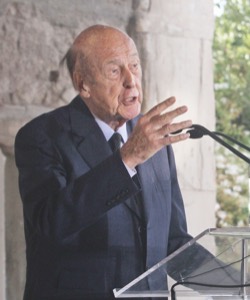 Valery Giscard d’Estaing
Valery Giscard d’Estaing
President of France, 1974-1981
“It’s named democracy, which means power of the group, not power of the individual. And now democracy looks a bit like monocracy that is done for the persons, but then it was to find what was good for the group. The vote was not meant to say what is good for me, it was to say what is good for Athens. So, we must remember this lesson, I think, and always in the democratic move, keep the spirit that at the end democracy is a way to serve the group and not to serve oneself.” (ADF, 2013)
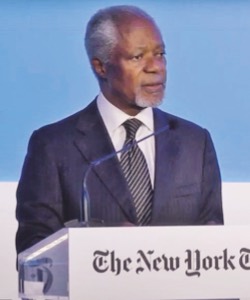 Kofi Annan
Kofi Annan
7th secretary-general of the United Nations, 1997-2006
“As you ponder democracy, be inspired by this unique city, which over 2,000 years ago created a revolutionary system of government, in which the free were the rulers, subservient only to the laws they themselves had passed. They called it ‘dimokratia,’ literally the rule of the people, and that inspiration still resonates around the world today. I always say that when leaders fail to lead, the people will lead and make them follow.” (ADF, 2017)
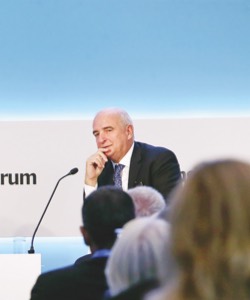 Roger Cohen
Roger Cohen
New York Times journalist, Paris bureau chief and ADF host
“I think that the word ‘stoa’ is linked to the word ‘stoicism’ and God knows we need a fair amount of that forgotten quality these days. Democracy is engagement, it’s community, it’s the capacity for civilized disagreement, and I think all of you testify to that spirit by being part of this remarkable Athens Democracy Forum.” (ADF, 2018)
 Clover Hogan
Clover Hogan
Climate activist and founding CEO of Force of Nature
“Fear, in the context of an existential challenge like climate change, like a pandemic, fear breeds apathy, it breeds nihilism, it breeds the belief that we are too small to make a difference and that the system is too broken to create meaningful change. And that is why I believe that one of the most powerful things that we can do is begin to rewrite the stories that we hold to be true about the world and about our role in it and shift from this place of anxiety to real agency.” (ADF, 2020)
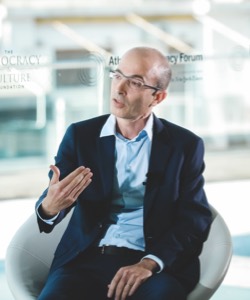 Yuval Noah Harari
Yuval Noah Harari
Historian, writer
“Twenty years ago, it was a few corporations or entrepreneurs who understood this idea, that those who control the flow of data of the world will control the world. About five, six years ago, a couple of governments began to understand the same principle… The question is, who controls the flow of data in the world? It seems that we are in the first stages of a digital cold war – the same way that we had the Iron Curtain coming down after the Second World War, now there is increasingly a ‘Silicon Curtain’ dividing the world. Which side of the curtain you are on depends on what code is running on your smartphone.” (ADF, 2021)
